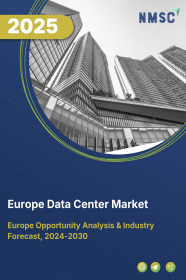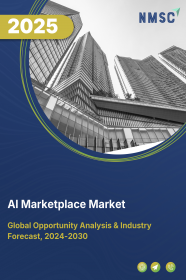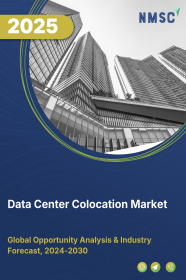
Europe Data Center Market by Component (Hardware, Software, Service), by Type (Colocation, Hyperscale, Edge, Other Types), by Deployment Model (On-Premises, Cloud, Hybrid), by Tier Standard (Tier 1, Tier 2, Tier 3, Tier 4), by Energy Requirement & Power Density (Low Power, Medium Power, High Power), by Cooling Techniques (Air Cooling, Liquid Cooling, Others), by Enterprise Size (Large Enterprises, Others), by End User (BFSI, Other End Users)- Opportunity Analysis and Industry Forecast, 2024–2030
Industry: ICT & Media | Publish Date: 09-Apr-2025 | No of Pages: 277 | No. of Tables: 215 | No. of Figures: 160 | Format: PDF | Report Code : IC2433
US Tariff Impact on Europe Data Center Market
Trump Tariffs Are Reshaping Global Business
Europe Data Center Market Overview
The Europe Data Center Market size was valued at USD 55.65 billion in 2023, and is predicted to reach USD 122.58 billion by 2030, at a CAGR of 11.9% from 2024 to 2030.
The data center, also recognized as the network infrastructure market, encompasses the planning, construction, operation, and maintenance of dedicated infrastructure for housing computing systems. It includes various elements such as servers, storage systems, and networking equipment, offering services such as cloud computing and connectivity solutions. Currently, the industry witness widespread adoption of cloud services, along with the emergence of edge computing to reduce latency.
Major trends include a focus on sustainability, heightened cybersecurity concerns, the integration of hybrid and multi-cloud approaches, and the impact of 5G networks. These trends highlight the industry's response to the increasing demand for scalable, efficient, and secure data processing and storage solutions in the era of digital transformation. According to the United States International Trade Commission, the data processing and storage market is expected to grow from USD 56 billion in 2020 to USD 90 billion by 2025.
Digital Transformation Initiatives Propels the Growth of the Market
Across Europe, businesses are increasingly embracing digital transformation initiatives to stay competitive in a rapidly evolving marketplace. This drive towards digitalization necessitates robust data center infrastructure to support the burgeoning volumes of data generated and processed by organizations.
As companies adopt cloud computing, big data analytics, Internet of Things (IoT), and other emerging technologies, the demand for network infrastructure services escalates. Additionally, the COVID-19 pandemic accelerated the adoption of remote work and online services, further fuelling the need for reliable network infrastructure facilities to ensure seamless connectivity and data accessibility.
Regulatory Compliance and Data Sovereignty Boosts the Market Growth
Stringent data protection regulations such as the General Data Protection Regulation (GDPR) in the European Union mandate that organizations store and process data within the region's boundaries. This emphasis on data sovereignty necessitates the establishment of local data center to ensure compliance with regulatory requirements.
Furthermore, heightened concerns regarding data privacy and security compel businesses to prioritize network infrastructure facilities that adhere to rigorous compliance standards. Consequently, the demand for network infrastructure services in Europe continues to surge as organizations seek secure and compliant infrastructure to safeguard sensitive information and mitigate regulatory risks.
High Initial Investment Challenges Market Growth
The data center industry faces significant obstacles, notably the substantial upfront investment required and strict environmental regulations. Establishing and maintaining network infrastructure demands considerable financial commitments upfront, posing barriers for smaller enterprises and startups. Moreover, ongoing compliance with environmental standards necessitates continual investments in energy-efficient technologies hinders the market growth.
Integration of Edge Computing Presents Lucrative Opportunity for Market Expansion
The integration of edge computing into network infrastructure operations presents compelling prospects for the industry's advancement. By minimizing latency and enabling real-time processing, edge computing supports applications such as Internet of Things (IoT) and Augmented Reality (AR), alleviating pressure on centralized cloud data center while providing scalability and flexibility.
This decentralized approach not only enhances security by processing sensitive data locally but also aligns with evolving digital landscapes, paving the way for diverse opportunities for network infrastructure providers. Recent investments in startups such as Armada signify the burgeoning interest in edge computing solutions, indicative of a concerted effort to address connectivity challenges and bridge the digital divide.
Germany Holds the Dominant Market Share in Europe Data Center Market
The data center market in Germany experienced significant growth, driven by ongoing digital transformation efforts and the increasing demand for Industry 4.0, Internet of Things (IoT), cloud services, big data analytics, data security, and AI applications. Frankfurt am Main notably become one of Europe's leading hubs for network infrastructure, alongside London, Amsterdam, and Paris.
With 522 operational centers, Germany holds the highest number of such facilities in Europe, cementing its status as one of the largest markets in the region. This rising demand highlights Germany's crucial role in supporting the evolving needs of digital businesses across various sectors. Additionally, the expansion of major global companies, such as Alphabet Inc. and Alibaba Group Holding Ltd., is a significant factor driving the demand for data centers in Germany.
For example, Google recently invested USD 1.08 billion in a new cloud region in Berlin-Brandenburg, its second in Germany by 2030. This investment enhances digital infrastructure by offering services such as Compute Engine, Kubernetes Engine, and Cloud Storage.
The Berlin-Brandenburg region provides local cloud capacity to Google Cloud customers, enabling efficient scaling of workloads. This expansion aligns with Google Cloud's global network strategy, that includes 38 regions and 115 zones, further solidifying Germany's position as a key market for investments.
Denmark to Witness Substantial Growth in the Europe Data Center Market
Denmark's advanced digitalization and consistent demand for cutting-edge software and IT products make it a prime environment for the expansion of the data center industry. Ranking third among 130 economies in the World Economic Forum's "Network Readiness Index" in 2021, Denmark provides an ideal setting for developing and enhancing digital infrastructure, that in turn fuels the progress of the market sector.
Moreover, Denmark's commitment to achieving net-zero carbon emissions led to collaboration among prominent players to expedite the green transition of network infrastructure, thereby driving Europe data center market growth. Collaborative efforts, such as the net-zero innovation hub for network infrastructure involving Danfoss, Google, Microsoft, and Schneider Electric, underscore a shared dedication to sustainability and energy efficiency in the European market landscape, highlighting the crucial role of cloud computing in digital and green transformations.
Moreover, the growth of Denmark's market industry is further propelled by the influx of global corporations into the country, coupled with partnerships with local authorities. These collaborative endeavors attract international cloud providers, Internet businesses, AI ventures, and global Fortune 500 companies, enriching the network infrastructure ecosystem.
Noteworthy examples include Prime's 124 MW data center in Saeby, Denmark, designed to cater to international cloud providers and Fortune 500 companies, with a strong emphasis on sustainability and a net-positive environmental impact.
Such collaborations demonstrate the potential for network infrastructure to contribute positively to local communities while aligning with Environmental, Social, and Governance (ESG) goals, further solidifying Denmark's position as a key player in the global market landscape.
Competitive Landscape
The key players operating in the Europe data center industry include China Telecom, Equinix, Digital Realty, Zenlayer, Amazon Web Services (AWS), 365 Data Centers, MOD Mission Critical (MOD), IBM Cloud, Cogent Communications, EdgeConnex, and others.
Europe Data Center Market Key Segments
By Component
- Hardware
- UPS
- Generators
- Transfer Switches
- Cooling Systems
- Computer Room Air Conditioning (CRAC)
- Racks
- Others
- Software
- Services
By Type
-
Colocation
-
Hyperscale
-
Edge
-
Others
By Deployment Model
-
On-Premises
-
Cloud
-
Hybrid
By Tier Standard
-
Tier 1
-
Tier 2
-
Tier 3
-
Tier 4
By Energy Requirement and Power Density
-
Low Power (Less than 20MW)
-
Medium Power (20-100MW)
-
High Power (100MW and More)
By Cooling Techniques
-
Air Cooling
-
Liquid Cooling
-
Dry Cooling
-
Immersion Cooling
-
Others
By Enterprise Size
-
Large Enterprise
-
Small and Medium Size Enterprise
By End User
-
BFSI
-
IT and Telecom
-
Government
-
Energy and Utilities
-
Other End Users
By Country
-
The UK
-
Germany
-
France
-
Italy
-
Spain
-
Denmark
-
Netherlands
-
Finland
-
Sweden
-
Norway
-
Russia
-
Rest of Europe
Key Players
-
IBM Corporation
-
Amazon Web Services, Inc.
-
Microsoft Corporation
-
Cisco Systems, Inc.
-
Oracle Corporation
-
SAP SE
-
Hewlett Packard Enterprise Development LP
-
Equinix Inc.
-
NTT Ltd
-
Telia Helsinki
-
DATA4
-
Digital Realty Trust
-
Hivelocity, Inc.
-
EdgeConneX Inc.
-
Vantage Data Centers
REPORT SCOPE AND SEGMENTATION:
|
Parameters |
Details |
|
Market Size in 2023 |
USD 55.65 Billion |
|
Revenue Forecast in 2030 |
USD 122.58 Billion |
|
Growth Rate |
CAGR of 11.9% from 2024 to 2030 |
|
Analysis Period |
2023–2030 |
|
Base Year Considered |
2023 |
|
Forecast Period |
2024–2030 |
|
Market Size Estimation |
Billion (USD) |
|
Growth Factors |
|
|
Countries Covered |
12 |
|
Companies Profiled |
15 |
|
Market Share |
Available for 10 companies |
|
Customization Scope |
Free customization (equivalent up to 80 working hours of analysts) after purchase. Addition or alteration to country, regional, and segment scope. |
|
Pricing and Purchase Options |
Avail customized purchase options to meet your exact research needs. |

















 Speak to Our Analyst
Speak to Our Analyst





















